人教版(2019)选择性必修 第一册Unit 4 Body Language单元语法详解课件(共19张PPT)
文档属性
| 名称 | 人教版(2019)选择性必修 第一册Unit 4 Body Language单元语法详解课件(共19张PPT) |
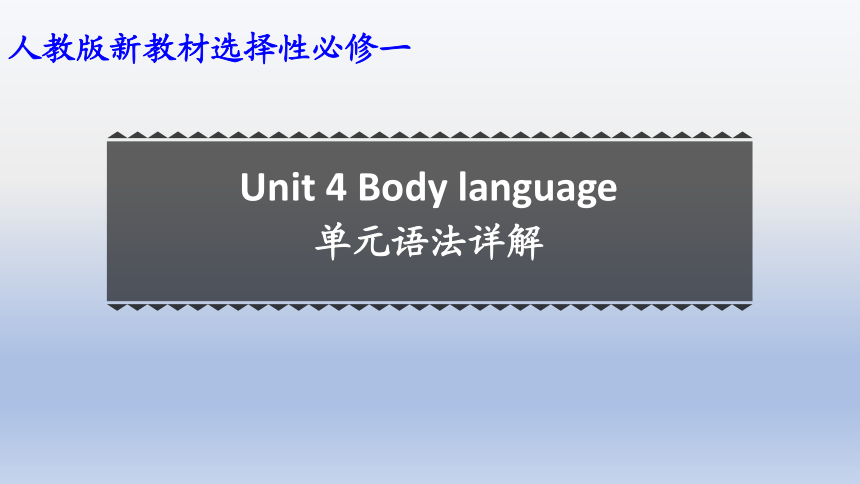
|
|
| 格式 | pptx | ||
| 文件大小 | 1.3MB | ||
| 资源类型 | 教案 | ||
| 版本资源 | 人教版(2019) | ||
| 科目 | 英语 | ||
| 更新时间 | 2023-03-11 20:13:25 | ||
图片预览


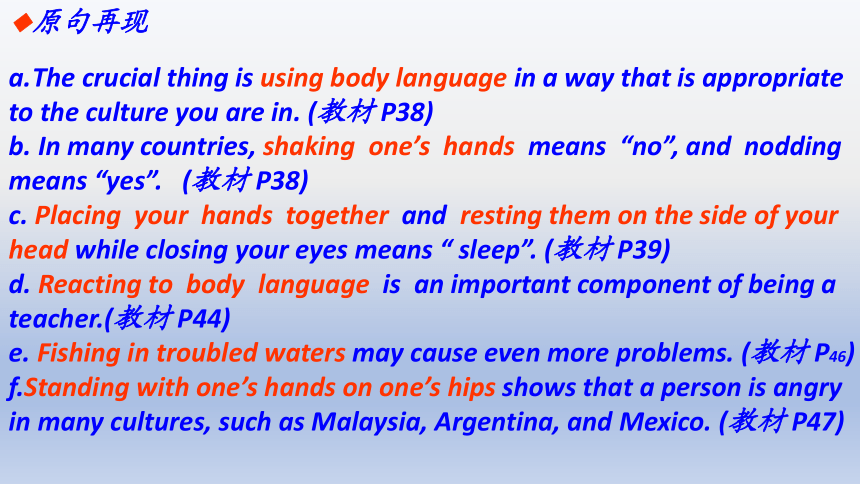

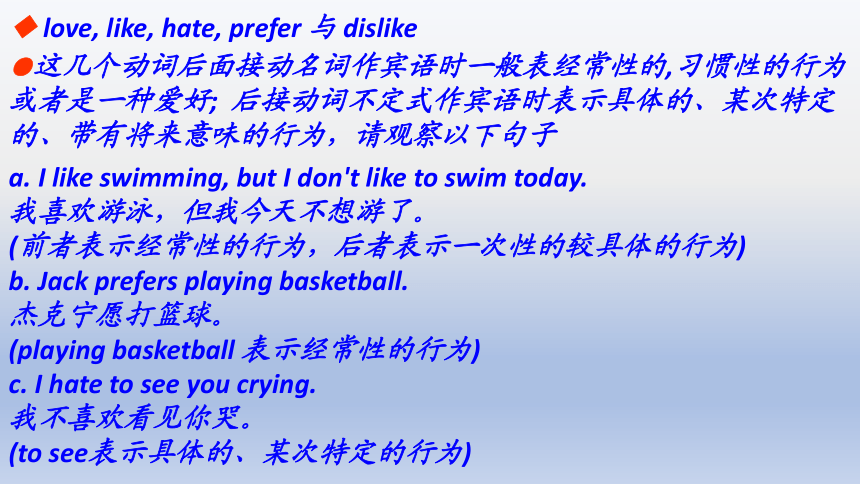
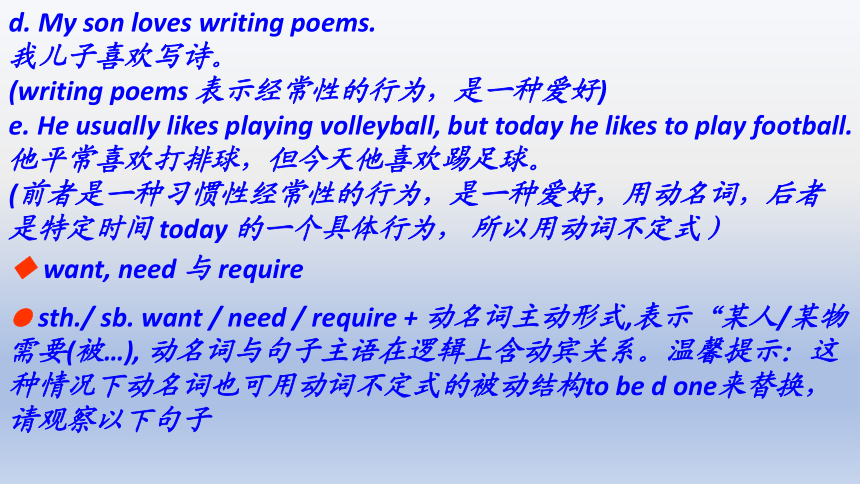
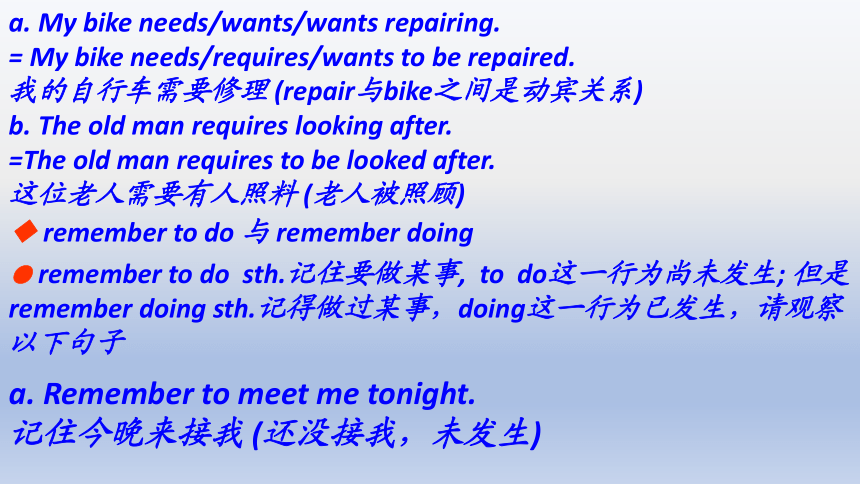
文档简介
(共19张PPT)
Unit 4 Body language
单元语法详解
人教版新教材选择性必修一
本单元重要语法
→动名词特辑
◆原句再现
The crucial thing is using body language in a way that is appropriate
to the culture you are in. (教材 P38)
b. In many countries, shaking one’s hands means “no”, and nodding
means “yes”. (教材 P38)
c. Placing your hands together and resting them on the side of your
head while closing your eyes means “ sleep”. (教材 P39)
d. Reacting to body language is an important component of being a
teacher.(教材 P44)
e. Fishing in troubled waters may cause even more problems. (教材 P46)
f.Standing with one’s hands on one’s hips shows that a person is angry
in many cultures, such as Malaysia, Argentina, and Mexico. (教材 P47)
英语中,某些动词后面既可以接动名词也可以接动词不定式,但表示的意义不同
◆ love, like, hate, prefer 与 dislike
●这几个动词后面接动名词作宾语时一般表经常性的,习惯性的行为
或者是一种爱好; 后接动词不定式作宾语时表示具体的、某次特定的、带有将来意味的行为,请观察以下句子
a. I like swimming, but I don't like to swim today.
我喜欢游泳,但我今天不想游了。
(前者表示经常性的行为,后者表示一次性的较具体的行为)
b. Jack prefers playing basketball.
杰克宁愿打篮球。
(playing basketball 表示经常性的行为)
c. I hate to see you crying.
我不喜欢看见你哭。
(to see表示具体的、某次特定的行为)
d. My son loves writing poems.
我儿子喜欢写诗。
(writing poems 表示经常性的行为,是一种爱好)
e. He usually likes playing volleyball, but today he likes to play football.
他平常喜欢打排球,但今天他喜欢踢足球。
(前者是一种习惯性经常性的行为,是一种爱好,用动名词,后者是特定时间 today 的一个具体行为, 所以用动词不定式)
◆ want, need 与 require
● sth./ sb. want / need / require + 动名词主动形式,表示“某人/某物需要(被…), 动名词与句子主语在逻辑上含动宾关系。温馨提示:这种情况下动名词也可用动词不定式的被动结构to be d one来替换,请观察以下句子
a. My bike needs/wants/wants repairing.
= My bike needs/requires/wants to be repaired.
我的自行车需要修理 (repair与bike之间是动宾关系)
b. The old man requires looking after.
=The old man requires to be looked after.
这位老人需要有人照料 (老人被照顾)
◆ remember to do 与 remember doing
● remember to do sth.记住要做某事, to do这一行为尚未发生; 但是remember doing sth.记得做过某事,doing这一行为已发生,请观察以下句子
a. Remember to meet me tonight.
记住今晚来接我 (还没接我,未发生)
b. I remember being taken to Beijing when I was a child.
我记得我在小时候被带到北京去过 (我已经被带去过、已发生)
● forget to do sth. 忘记了要做某事(表to do这一动作尚未执行); forget doing sth. 忘记了曾做过 (doing这一行为已执行, 只是后来忘记了而已),请观察以下句子
◆ forget to do 与 forget doing
a. The light in the office is still on. I forgot to turn it off last night.
办公室的灯现在还亮着。我昨晚忘记关灯了 (“关灯”这动作未发生)
b. I’ll never forget seeing the musical comedy in New York.
我永远忘不了在纽约所看过的那场歌舞喜剧 (“看”的动作已经发生)
◆ regret to do 与 regret doing
● regret to do sth. 对要做的事表示抱歉 (to do紧跟在regret之后生)
;regret doing sth.后悔做过某事 (doing这一行为发生在 regret之前),请观察以下句子
a. I regret to inform you that you are dismissed.
我很遗憾地告诉你,你被解雇了( inform发生在 regret之后)
b. I regret not having taken his advice. (not having taken his advice.
我后悔没有听他的劝告发生在 regret之前)
◆ try to do 与 try doing
● try to do sth. 尽力做某事,努力做某事 (表示设法完成某种困难较大的事);try doing sth.试着做 (强调方法是否得当,看看会发生什么), 请观察以下句子
a. He tried to improve his English.
他努力地提高他的英语水平
b. He tried to break away from me.
他想和我断绝关系
c. Let's try doing it some other way.
我们换别的方法试试看
d. He tried cleaning the spot with alcohol.
他试着用酒精擦拭那污迹
◆ can’t help (to) do 与 can't help doing
● can't help (to) do 不能帮忙做;can't help doing情不自禁地,请观察以下句子
a. I'm sorry. I can't help (to) clean the windows.
对不起,我不能帮忙擦 窗子了
b. He couldn't help laughing when he heard the news.
当听到那个消息时,他情不自禁地笑了
c. The little girl couldn’t help bursting into tears when she saw her mother.
看到他妈妈小女孩儿情不自禁大哭起来
d. She couldn’t help (to) look after her grandma because she
was too busy.
她不能帮助照顾她奶奶,因为她实在太忙了
e. The old man couldn’t help thinking of his childhood.
这位老人情不自禁想起了自己的童年时代
◆ go on to do 与 go on doing
● go on to do sth. (已做完一件事 ) 接着做 (另一事 ); go on doing sth. 继续干同一件事,请观察以下句子
a. Having washed the clothes, my mother went on to sweep the floor.
洗完衣服后,我妈妈接着扫地
b. They went on working in the fields after dark.
天黑后,他们仍继续在田里干活
c. After reading the text, he went on to do his homework.
读完课文,他接着做作业
d. They went on repairing the same computer after taking a short rest.
短暂休息之后,他们继续修理同一台电脑
◆ mean to do 与 mean doing sb.
● mean to do sth. 某人打算干 ( 主语为人 );sth. /doing sth. mean doing sth. (做)某事意味着干 (主语为事物),请观察以下句子
a. I had meant to come earlier.
我本打算早点来
b. Missing the train means waiting for another hour.
误了这趟火车就意味着要再等一个小时
c. His plan means wasting money and time.
他的计划意味着浪费时间和钱
d. They meant to go swimming yesterday but it suddenly rained hard.
昨天他们打算去游泳的,但是天突然下大雨了
e. Losing job means going hungry.
失业就是意味着挨饿
◆ stop to do 与 stop doing
● stop to do sth. 停下来去做....( to do作目的状语,表示停下来的目的是为了执行 to do这一动作 );stop doing sth.停止做....(表示停止doing这一行为),请观察以下句子
a. He stopped to talk to me when he met me on the street.
当他在街上见到我时,他停下来和我打招呼
b. They stopped to write on the blackboard.
他们停下来,在黑板上写字 (表示停下来为了to write)
c. It's time for class. Please stop talking.
上课时间已到,请停止谈话 (表示停止 talking这一动作 )
◆考点训练
1. The president would attend the meeting himself, ______ gave them a great deal of encouragement.
A. The president would attend B. The president to attend
C. The president attended D. The president’s attending
2 How about the two of us ________ a walk down the garden
A. to take B. take C. taking D. will take
3. It is difficult to imagine his ____________ the decision without any consideration.
A. accept B. accepting C. to accept D. accepted
4. I can’t stand _______ with Jane in the same office. I am tired of her
speaking noisily.
A. working B. to work C. having worked D. to have worked
D
C
B
A
5. I remember _________ to Beijing as a small boy.
A. to take B. to be taking C. to be taken D. being taken
6. I really can’t understand ________ her like that.
A. you treat B. you to treat C. why treat D. you treating
7. Tom was very unhappy for ________ to the party.
A. having not been invited B. not having invited
C. having not invited D. not having been invited
8. Our monitor suggested _________ a discussion of this subject.
to have B. should have C. have D. having
9. We think the film is ________.
worth to see B. worthy of seeing C. worth seeing D. worthy to see
10. -- Let’s have a break. --Not now, I don’t want _______ yet.
A. to stop study B. stopping to studying
C. to stop studying D. stopping studying
D
D
D
D
C
C
11. --You should say sorry to your brother. -- Yes, I regret ______ with him.
A. quarreling B. quarreled C. to quarrel D. to have quarreled
12. The sick woman needs _______ after.
A. looking B. to be looked C. being looked D. A and D
13. Mary has been _______ her job but she hasn’t decided yet.
A. considering changing B. considered changing
C. considering to change D. considered to have changed
14. -- The light in the office is still on. -- Oh, I forgot _______.
A. turning it off B. turn it off C. to turn it off D. having turned it off
15. They now regret _______ so soon.
get B. getting C. to get D. to have got
16. She can’t help _______ the house because she’s busy making cakes.
A. to clean B. cleaning C. cleaned D. being cleaned
A
D
A
C
B
A
17. He has always insisted on _______ Dr. Turner instead of Mr. Turner.
A. he should be called B. he is called C. his called D. his being called
18. While shopping, people sometimes can’t help ________ into buying something they don’t really need.
A. to persuade B. persuading C. being persuaded D. persuade
19. I am sorry for ________ ahead of time.
A. letting you not know B. not letting you know
C. letting you know not D. letting not you know
20. What worried the child most was ________ to visit his mother in hospital.
A. his not allowing B. his not being allowed
C. his being not allowed D. having not been allowed
D
C
B
B
That’s all!
Thank you!
Unit 4 Body language
单元语法详解
人教版新教材选择性必修一
本单元重要语法
→动名词特辑
◆原句再现
The crucial thing is using body language in a way that is appropriate
to the culture you are in. (教材 P38)
b. In many countries, shaking one’s hands means “no”, and nodding
means “yes”. (教材 P38)
c. Placing your hands together and resting them on the side of your
head while closing your eyes means “ sleep”. (教材 P39)
d. Reacting to body language is an important component of being a
teacher.(教材 P44)
e. Fishing in troubled waters may cause even more problems. (教材 P46)
f.Standing with one’s hands on one’s hips shows that a person is angry
in many cultures, such as Malaysia, Argentina, and Mexico. (教材 P47)
英语中,某些动词后面既可以接动名词也可以接动词不定式,但表示的意义不同
◆ love, like, hate, prefer 与 dislike
●这几个动词后面接动名词作宾语时一般表经常性的,习惯性的行为
或者是一种爱好; 后接动词不定式作宾语时表示具体的、某次特定的、带有将来意味的行为,请观察以下句子
a. I like swimming, but I don't like to swim today.
我喜欢游泳,但我今天不想游了。
(前者表示经常性的行为,后者表示一次性的较具体的行为)
b. Jack prefers playing basketball.
杰克宁愿打篮球。
(playing basketball 表示经常性的行为)
c. I hate to see you crying.
我不喜欢看见你哭。
(to see表示具体的、某次特定的行为)
d. My son loves writing poems.
我儿子喜欢写诗。
(writing poems 表示经常性的行为,是一种爱好)
e. He usually likes playing volleyball, but today he likes to play football.
他平常喜欢打排球,但今天他喜欢踢足球。
(前者是一种习惯性经常性的行为,是一种爱好,用动名词,后者是特定时间 today 的一个具体行为, 所以用动词不定式)
◆ want, need 与 require
● sth./ sb. want / need / require + 动名词主动形式,表示“某人/某物需要(被…), 动名词与句子主语在逻辑上含动宾关系。温馨提示:这种情况下动名词也可用动词不定式的被动结构to be d one来替换,请观察以下句子
a. My bike needs/wants/wants repairing.
= My bike needs/requires/wants to be repaired.
我的自行车需要修理 (repair与bike之间是动宾关系)
b. The old man requires looking after.
=The old man requires to be looked after.
这位老人需要有人照料 (老人被照顾)
◆ remember to do 与 remember doing
● remember to do sth.记住要做某事, to do这一行为尚未发生; 但是remember doing sth.记得做过某事,doing这一行为已发生,请观察以下句子
a. Remember to meet me tonight.
记住今晚来接我 (还没接我,未发生)
b. I remember being taken to Beijing when I was a child.
我记得我在小时候被带到北京去过 (我已经被带去过、已发生)
● forget to do sth. 忘记了要做某事(表to do这一动作尚未执行); forget doing sth. 忘记了曾做过 (doing这一行为已执行, 只是后来忘记了而已),请观察以下句子
◆ forget to do 与 forget doing
a. The light in the office is still on. I forgot to turn it off last night.
办公室的灯现在还亮着。我昨晚忘记关灯了 (“关灯”这动作未发生)
b. I’ll never forget seeing the musical comedy in New York.
我永远忘不了在纽约所看过的那场歌舞喜剧 (“看”的动作已经发生)
◆ regret to do 与 regret doing
● regret to do sth. 对要做的事表示抱歉 (to do紧跟在regret之后生)
;regret doing sth.后悔做过某事 (doing这一行为发生在 regret之前),请观察以下句子
a. I regret to inform you that you are dismissed.
我很遗憾地告诉你,你被解雇了( inform发生在 regret之后)
b. I regret not having taken his advice. (not having taken his advice.
我后悔没有听他的劝告发生在 regret之前)
◆ try to do 与 try doing
● try to do sth. 尽力做某事,努力做某事 (表示设法完成某种困难较大的事);try doing sth.试着做 (强调方法是否得当,看看会发生什么), 请观察以下句子
a. He tried to improve his English.
他努力地提高他的英语水平
b. He tried to break away from me.
他想和我断绝关系
c. Let's try doing it some other way.
我们换别的方法试试看
d. He tried cleaning the spot with alcohol.
他试着用酒精擦拭那污迹
◆ can’t help (to) do 与 can't help doing
● can't help (to) do 不能帮忙做;can't help doing情不自禁地,请观察以下句子
a. I'm sorry. I can't help (to) clean the windows.
对不起,我不能帮忙擦 窗子了
b. He couldn't help laughing when he heard the news.
当听到那个消息时,他情不自禁地笑了
c. The little girl couldn’t help bursting into tears when she saw her mother.
看到他妈妈小女孩儿情不自禁大哭起来
d. She couldn’t help (to) look after her grandma because she
was too busy.
她不能帮助照顾她奶奶,因为她实在太忙了
e. The old man couldn’t help thinking of his childhood.
这位老人情不自禁想起了自己的童年时代
◆ go on to do 与 go on doing
● go on to do sth. (已做完一件事 ) 接着做 (另一事 ); go on doing sth. 继续干同一件事,请观察以下句子
a. Having washed the clothes, my mother went on to sweep the floor.
洗完衣服后,我妈妈接着扫地
b. They went on working in the fields after dark.
天黑后,他们仍继续在田里干活
c. After reading the text, he went on to do his homework.
读完课文,他接着做作业
d. They went on repairing the same computer after taking a short rest.
短暂休息之后,他们继续修理同一台电脑
◆ mean to do 与 mean doing sb.
● mean to do sth. 某人打算干 ( 主语为人 );sth. /doing sth. mean doing sth. (做)某事意味着干 (主语为事物),请观察以下句子
a. I had meant to come earlier.
我本打算早点来
b. Missing the train means waiting for another hour.
误了这趟火车就意味着要再等一个小时
c. His plan means wasting money and time.
他的计划意味着浪费时间和钱
d. They meant to go swimming yesterday but it suddenly rained hard.
昨天他们打算去游泳的,但是天突然下大雨了
e. Losing job means going hungry.
失业就是意味着挨饿
◆ stop to do 与 stop doing
● stop to do sth. 停下来去做....( to do作目的状语,表示停下来的目的是为了执行 to do这一动作 );stop doing sth.停止做....(表示停止doing这一行为),请观察以下句子
a. He stopped to talk to me when he met me on the street.
当他在街上见到我时,他停下来和我打招呼
b. They stopped to write on the blackboard.
他们停下来,在黑板上写字 (表示停下来为了to write)
c. It's time for class. Please stop talking.
上课时间已到,请停止谈话 (表示停止 talking这一动作 )
◆考点训练
1. The president would attend the meeting himself, ______ gave them a great deal of encouragement.
A. The president would attend B. The president to attend
C. The president attended D. The president’s attending
2 How about the two of us ________ a walk down the garden
A. to take B. take C. taking D. will take
3. It is difficult to imagine his ____________ the decision without any consideration.
A. accept B. accepting C. to accept D. accepted
4. I can’t stand _______ with Jane in the same office. I am tired of her
speaking noisily.
A. working B. to work C. having worked D. to have worked
D
C
B
A
5. I remember _________ to Beijing as a small boy.
A. to take B. to be taking C. to be taken D. being taken
6. I really can’t understand ________ her like that.
A. you treat B. you to treat C. why treat D. you treating
7. Tom was very unhappy for ________ to the party.
A. having not been invited B. not having invited
C. having not invited D. not having been invited
8. Our monitor suggested _________ a discussion of this subject.
to have B. should have C. have D. having
9. We think the film is ________.
worth to see B. worthy of seeing C. worth seeing D. worthy to see
10. -- Let’s have a break. --Not now, I don’t want _______ yet.
A. to stop study B. stopping to studying
C. to stop studying D. stopping studying
D
D
D
D
C
C
11. --You should say sorry to your brother. -- Yes, I regret ______ with him.
A. quarreling B. quarreled C. to quarrel D. to have quarreled
12. The sick woman needs _______ after.
A. looking B. to be looked C. being looked D. A and D
13. Mary has been _______ her job but she hasn’t decided yet.
A. considering changing B. considered changing
C. considering to change D. considered to have changed
14. -- The light in the office is still on. -- Oh, I forgot _______.
A. turning it off B. turn it off C. to turn it off D. having turned it off
15. They now regret _______ so soon.
get B. getting C. to get D. to have got
16. She can’t help _______ the house because she’s busy making cakes.
A. to clean B. cleaning C. cleaned D. being cleaned
A
D
A
C
B
A
17. He has always insisted on _______ Dr. Turner instead of Mr. Turner.
A. he should be called B. he is called C. his called D. his being called
18. While shopping, people sometimes can’t help ________ into buying something they don’t really need.
A. to persuade B. persuading C. being persuaded D. persuade
19. I am sorry for ________ ahead of time.
A. letting you not know B. not letting you know
C. letting you know not D. letting not you know
20. What worried the child most was ________ to visit his mother in hospital.
A. his not allowing B. his not being allowed
C. his being not allowed D. having not been allowed
D
C
B
B
That’s all!
Thank you!
